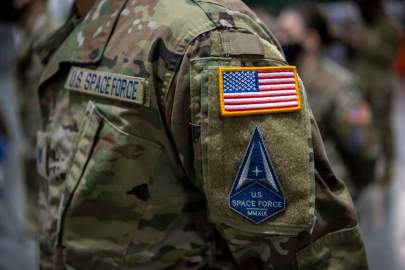Space Force wants to be the world’s first fully digital service

WASHINGTON — The U.S. Space Force released its latest vision document May 6, laying out its desire to become the world’s first fully digital service.
The Space Force believes digital solutions are necessary to accelerate its ability to develop, field and operate space capabilities quickly in order to maintain U.S. space supremacy.
“Space is a big data environment,” said Chief of Space Operations Gen. Jay Raymond, noting that all of the service’s mission areas — missile warning, weather, domain awareness, surveillance, and position, navigation and timing — all depend on data and analysis.
“This is a really important document for our service,” he said in a media call. “The establishment of the U.S. Space Force gives us a generational opportunity to create a service that is purpose built for a very unique operating environment. And when you think about our strategic competitors and the threats that we currently face, becoming a digital service is much more than an opportunity ― it’s a necessity.”
In the document, Raymond said becoming a digital service is imperative due to the nature of the threat and the small size of the Space Force. The rapid pace with which American adversaries are developing new capabilities requires a new, faster approach from the U.S. military, he argued. Space Force leadership has asserted since its inception that nations such as Russia and China are working diligently to negate American space capabilities.
The size of the Space Force compared to the other services also necessitates a digitally fluent workforce.
“The Space Force is a small, specialized service with an expansive mission. It is inherently more bound to and driven by technology than any other mission set,” said Chief Technology and Innovation Officer Maj. Gen. Kimberly Crider. “We must be committed in turn to providing them [Guardians] with the digital age knowledge, tools and processes they can use and enable and empower their peak performance and unlimited potential in advancing how we design, develop, field and operate space capabilities today and into the future.”
The service tasked its Technology and Innovation Office with leading the digital transformation.
The vision outlines four digital focus areas: engineering, workforce, headquarters and operations.
As part of the digital engineering line of effort, the Space Force is establishing a new Digital Engineering Ecosystem, a cloud-based environment where the government can work with industry to review programs and share digital twins that mold a process or technology virtually. The initial unclassified version is coming online now, said Crider, while a classified environment is expected in late summer or early fall.
Other implementations of the digital service include using artificial intelligence to process applications as part of the hiring process and using data analytics to drive decision-making, said Crider. The Space Force is also creating digital workforce initiatives to provide Guardians access to an online learning platform and track their progress in becoming more digitally proficient. Every Space Force member will receive digital university licenses, and 30 percent of the workforce has already completed coursework, Crider noted. The service is also creating combat development teams to focus on unit-level innovation.
Other aspects of the digital service vision, such as the Unified Data Library, are already in use. The repository collects and integrates space situational awareness data from multiple sources to provide a common picture of tens of thousands of objects currently on orbit. The Space Force will stored the data needed for the Digital Engineering Ecosystem cloud in an instance of the UDL, Crider added.
Raymond said he was unable to discuss how much money the Space Force is investing in transforming into a digital service until budget proposals come out later this year. The Space Force will release a “transformational roadmap” with more details on how it will execute its vision this summer.
Photo: Airmen assigned to Travis Air Force Base, California, transition into the U.S. Space Force during a ceremony in February at the 621st Contingency Response Wing. (Nicholas Pilch/U.S. Air Force)
Link: https://www.c4isrnet.com/battlefield-tech/space/2021/05/06/space-force-wants-to-be-the-worlds-first-fully-digital-service/




